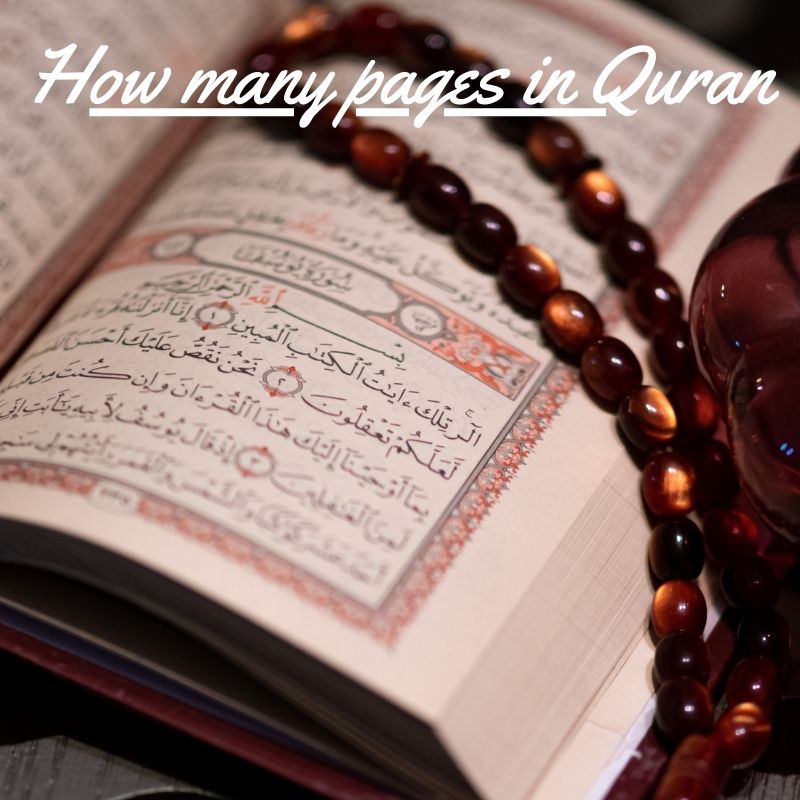The Quran is considered a voluminous book, and its exact page count varies based on the font size, layout, and edition. A regular or standard Arabic Quran usually consists of, on average, 604 pages. In different publications or references, it may have slightly different numbers of pages. The Quran has 114 calligraphic chapters, referred to as Surahs, and many verses, which are known as Ayahs. It is regarded as the most important divine document in Islam, and Muslims believe that it is the document through which the word of God was presented to Prophet Muhammad by the Angel Gabriel over a period spanning around 23 years.

How many verses are in the Quran?
Herein lies the conflict of opinion about this number. Some of the views argue for 6,238 verses while others pitch the number to 6,666. The conflict arises for the inclusion of “Bismillah” as a verse or not. The most widely accepted count is 6236, which accounts for the verses in chapter one and the other 113 chapters (excluding Bismillah), making it the most popular and agreed-upon number.
How Many Pages In One Para Of The Quran?

The whole Quran contains 30 equal parts, which is most commonly referred to as “juz” or “para” in Arabic. Usually, each juz would have around 20 pages, and most of the paras would be approximately of that in size. Of course, the number of pages can vary based on the font size, the issue of formatting, or the publishing house of the Quran edition used, but generally, it can be said that each juz runs to about 20 pages.
The Quran is divided in such a way that an individual can be a single month in reading and studying the whole of the Quran by reading one part a day. This format helps in memorizing and understanding the text of the Quran.
For each juz, an approximate average of 20 pages can be calculated. It should also be noted that there is no particular number of pages fixed for any given juz because this number is relative to the length and content of the verses within that part. Besides, the pagination between one copy of the Quran and another differs due to varying font size and dispersal of pages.
The number of the pages in an English translation of the Qur’an may vary based on different factors: size of text, pattern of the pages, and extra content such as footnotes, commentaries, and introductory material.
But on average, the length of a standard, English translation of the Quran is about 400-600 pages. That takes into account the space needed for a reasonable font size, line spacing as well as having space to include the additions in the Quranic text that the translator and or publisher want to include.
Its worth noting that length in the English translation have might not essentially directly relate the one in the Arabic text. The translations can differ in their approach towards the Quranic verses.
One had been that the Holy Quran was revealed during the month of Ramadan: a blessed period of fasting, prayer, and contemplation, and this togetherness of all Muslims. That happened on the night called “Laylat al-Qadr,” or the Night of Power, a night of immense value and grace.
Ramadan is the ninth month of the Islamic lunar calendar and hence the Muslims highly esteem it as well as respect it because it is the month in which the first revelation of the Qur’an was sent down. The Qur’an states that it is during this month, Ramadan, that it was enjoined and revealed to provide humankind with clear guidance to the right way and criterion for judging worthy from unworthy deeds.
According to Islamic tradition, the first revelation of the Quran came to the Prophet Muhammad (PBUH) while he had isolated himself in contemplation in the Cave of Hira on the outskirts of Mecca. It was here that the Angel Gabriel is said to have urged him: in the name of his Lord, recite the words you have read. Although the Prophet PBUH was illiterate he retained the words in his mind and wrote them down. This marked the beginning of prophethood.
The revelations from the Quran thus continued for twenty three years, covering all the spheres of life and laying down norms for the guidance of man. The Prophet (PBUH) recited these verses to his followers, who memorized and wrote them. After the passing away of the Prophet (PBUH), these were finally compiled by Abu Bakar, the first caliph and the closest companion of the Prophet, into book form.
Worldwide, Muslims hold Ramadan in high esteem, when they fast from dawn to sunset, do increased prayers and spiritual activities, striving to complete recitation of the Quran. Of particular importance is this night, referred to as the Night of Power, in which they worship and invoke harder as it is believed to be the night when the first revelation was made of the Quran.
Why Is The Quran Revealed In Arabic ?
It would not be surprising to anyone that the revelations of the Quran, as indicated in the following verse of Surah Yusuf, were in the Arabic language: “Indeed, We have sent it down as an Arabic Qur’an that you might understand.” Thus, one can justify the wisdom in the language use, which in Islam, means everything.
Of course, the language used by the Prophet Muhammad (Peace Be Upon Him) and his people from the Arabian Peninsula was Arabic, so this made a lot of sense and was the most suitable or accessible for the cause of the revelation of the Quran. The message of the Quran had to be obviously very clear for the Prophet’s (PBUH) community, and Arabic was perfect.
In spite of– He, the Prophet Muhammad (PBUH), never having learned to read and write, he who could dictinate the Quranic verses and they were memorized, written down by his companions; it is therefore through an oral tradition that the text of the Quran in its original language has been accurately preserved.
Packaging the linguistic richness of the Arabic language with heightened meaning accuracy allowed the translation of the many shades of meanings that are so intricately woven into the Quran, such subtlety and beauty of eloquent Arabic. The aesthetics and eloquence of Arabic bound up in the verses of the Quran emphasize the appeal of the recitations to the believers.
In addition, Arabic was chosen as the language of revelation to Allah so as to facilitate the spread of Islam beyond the Arabian Peninsula. As such, aside from becoming the language of the Quran, Arabic also became a major language of Islamic learning, culture, and civilization, and this led to the spread through the ages to different regions and peoples of Islamic tenets and teachings.
In other words, the selection of Arabic as the language of the Quran defines a conscious step by Allah toward clarity, ease of communication, and universal delivery of the message to the entire mankind.
Ways Non-Arabic Speakers Can Learn The Quran Online
There are several avenues that non-Arabic speakers can exploit in order to learn the Quran online. Some of the most common include:
Online Quran courses are available in a lot of online websites, and these courses are tailor-made for non-Arabic-speaking people, thereby prompting such individuals to take up Quran learning courses. Courses include instructions in recitation, Tajweed; memorization, Hifz; and understanding the meanings, Tafsir, of the Quranic verses. Levels range from beginner to advanced, depending on the student’s proficiency.
Also, there are numerous applications available on mobiles, which are specifically designed for learning the Quran. There are interactive lessons, available audio recitations, and also people get to test themselves through quizzes on memorizing and understanding the teachings at their own convenient pace. Some of the most popular Quran learning apps are Quran Companion, Memorize Quran for Kids & Adults, and Quran Majeed.
Similarly Quran virtual classes Most of the masjids and Islamic centers do offer virtual classes of Qur’an whereby the teachers are professional. Classes usually use video conferencing software such as Zoom and Skype, so the student can get to learn under a professional experienced teacher. In fact, the students can interact with the professional teachers and receive a proper response on how they sound in their reading and memorization of Quran.
YouTube Tutorials: The Holy Quran can also be learned through YouTube tutorials, many of which describe the process and rules in recitations and methods by which memorization can be achieved. Free YouTube video tutorials can be viewed on various channels for teaching the Holy Quran to non-Arabic speakers.. What Stops You From Learning? Just heed the process and the tips given so that you can remember your lessons and exercise them continuously.
Quran Translations and Commentaries: For non-Arabic speakers, the Quran could also be studied through its many translations and commentaries composed in one’s language. Several downloadable versions of the Quran in many languages, with a syllabus by the leading scholars, are found on the web portals and online websites. By reading different translated versions and commentaries, non-Arabic speakers can fathom in-depth the Holy Quranic text and its teachings.
Overall, the non-Arabic speakers have enough opportunities to learn Quran online. There exist online courses, apps, virtual classes, and even YouTube tutorials. With some dedication and focused time, individuals can really start wandering through the merits of research.e beauty and wisdom of the Quran, regardless of their linguistic background.

AoA, my name is Abd al-Rahman, and my vision is to spread the knowledge of the Quran to everyone. I am proud and tall while standing as your trusted mentor on the journey of learning and memorizing the Holy Quran. I, along with a committed team of Islamic teachers, am bound to provide an easy online facility for Islamic studies and Hifz programs.

